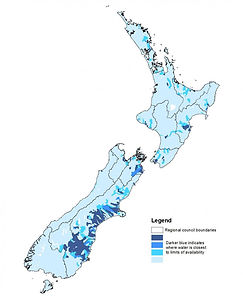DELIVERY WORLDWIDE
Our Planet
Waters Co are on target to becoming a carbon neutral business by incorporating wherever possible a paperless office environment by using technologies such as E.fax & recycling of materials wherever possible.
Our products offer a lifetime warranty & are designed to last, reducing waste & unnessescary landfill. Most materials are recyclable & the filter componants are all natural.
Our water filter products are recognised by the Environmental Protection Agency USA.
The “Waterman Mini Bio Mineral Pot” is providing a sustainable alternative to bottled water. Just one replaceable filter will produce the equivelant of around 1300 600ml bottles of prepackaged water. Are you doing your part to help provide a sustainable future?


New Zealand’s bottled water consumption was around 314,000 barrels of oil a year to package, ship and refrigerate in 2006. Consumption of bottled water is rising at a rate of 10 per cent a year in New Zealand, with around 65 per cent of plastic drink bottles ending up in landfill creating an eco-disaster. Drink bottles also take up more space than other waste, comprising 38 per cent of total volume of litter.
At around $1.20 – $4.00 per litre it’s often more expensive than petrol.
New Zealand’s freshwater bodies by world standards are of good quality. This means the water has an array of flora and fauna which is unique and which the world standards support as the bodies are highly regarded internationally for their recreational value.
Here we also have a varied range of water environments ranging from mountain springs to coastal estuaries, which are connected by a number of elaborate network of rivers, lakes, wetlands, estuaries and groundwater systems.
Fresh water in New Zealand is a vital source for its power to provide life. Water is valued here by Maori for its life-giving essence and also its spirituality. Although some people may like to say their city has the best water, quality coming from urban and rural areas is tainted.
This means it is now coming under increasing pressure as land use intensifies, which is causing worrying effects for marine life, our drinking water supplies, cultural values and any of out water-based recreation.
New Zealand’s consumption of bottled water and the toll on our planet.


Some of the New Zealand Drinking Water Standards are:
• A new section specifically dealing with small water suppliers
(ie: those serving populations under 500 people)
• A new section specifically covering tankered water suppliers
• A new section dealing with cyanobacteria (previously known as ‘blue-green algae’)
• Amendments to the compliance criteria for Cryptosporidium
• Minor changes to bacteriological compliance
• Inclusion of a section on disinfection using ultra-violet light
These only apply to any public and private supplies, but not any bottled water.
Definition of Water Supplies
Community: The people served by the supply.
Zone: (or Distribution Zone) That part of the town or community receiving water of similar quality. For a small supply, that means “everywhere”. For larger supplies, it may be only part of a town or city. By definition, parts receiving different water will be in different zones.
Plant: The treatment plant supplying the water. In some situations where no treatment is given, a nominal plant is defined as where the water is pumped from or merely gathered together. In others, the treatment plant will have highly technical operations with extensive automated control and monitoring of water quality.
Source: The river, groundwater, or other source from which the water is taken. About half of New Zealand’s drinking-water is pumped from the ground, with the remainder coming from surface sources.
Not All Water Is Created Equal
All life on earth was created from water. We are made up of approximately 70% water & it is essential for every bodily function.
At 1% dehydration we begin to feel thirsty. At 2% dehydration we are unable to function at our optimum level. At around 4% dehydration our ability to think clearly and cope with stress begins to diminish. We also start to feel tired & often sick. Death can occur at around 20% dehydration.
Extended periods of dehydration can have a significant effect on our health & our ability to fight off infection & disease. Many studies show that a significant percentage of people in our society are mildly dehydrated. There is no substitute for drinking water.
Coffee, tea & most soft drinks are diuretics, which all contribute to dehydration. Is it any wonder that we can feel tired & stressed for no apparent reason?
Our water sources are also under a great deal of stress, as we battle with droughts & an ever-growing population. Demand for quality drinking water has never been greater. Our government has a duty to provide us with water that is safe to drink, however the water quality at the point of consumption may not always be complimentary for our short or long-term health.
Contaminants including heavy metals, chemicals such as chlorine, bacteria, organic & in-organic compounds all can be present in our drinking water.
Given the importance of water to our wellbeing & every bodily function, we owe it to ourselves to ensure that the water we drink is as pure & fresh as possible!
We don’t all have a natural spring water source in our back yard & purchasing pre-bottled water can be both inconvenient & prohibitively expensive, both financially and environmentally.



